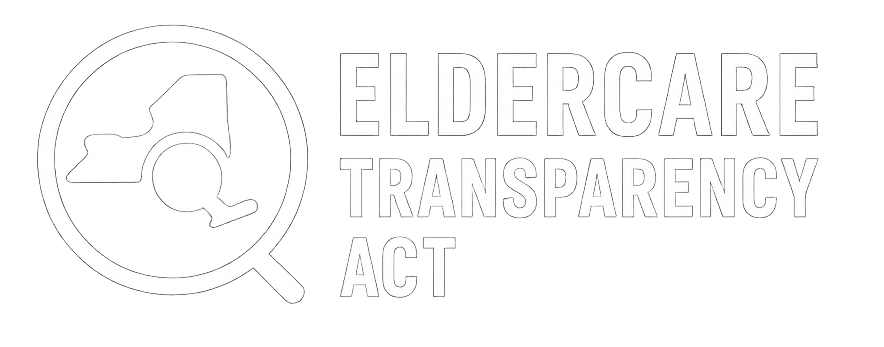About the Eldercare Transparency Act
Why the Eldercare Transparency Act was launched
Families across New York are searching for safe, reliable care for their loved ones, but too often, they are left in the dark.
Unlicensed or poorly regulated facilities advertise alongside legitimate providers, making it nearly impossible for families to know who they can trust. This lack of transparency has led to tragic outcomes, including the story of Bronia Rybsztajn, whose family discovered too late that the care they had chosen was not what it claimed to be. Her story is not unique, and it revealed a dangerous truth: New Yorkers deserve a clear way to distinguish licensed providers from those operating outside the law.
The ETA Goal
The Eldercare Transparency Act (ETA) was created to ensure accountability in eldercare. Our mission is simple: require every facility and home care provider to include their license type and number on all advertisements and marketing materials. This requirement must apply across every form of media, from traditional print ads and brochures to sponsored content in newspapers and magazines.
Far too often, local papers and industry publications run paid “advertorials” that look like independent reporting but are in fact purchased placements. Without verification of licensing, these articles give a false sense of legitimacy to providers who may be operating illegally. By mandating disclosure and verification in all print and marketing platforms, ETA closes this loophole and ensures that families can trust the information they see in both digital and print formats.
1. ETA seeks to require all eldercare facilities or home care agencies to list their license number on advertisements and marketing materials.
2. ETA seeks to require all eldercare facilities and home care agencies who use digital marketing (websites, emails, social media, and online newspapers) to include a live link to the state database showing their license.
The Eldercare Transparency Act (ETA) also addresses the growing use of digital marketing in eldercare. Facilities and home care agencies that promote their services through websites, email campaigns, social media, or online newspapers would be required to include a live link to the official state database showing their license record.
This simple step ensures that families can immediately verify a provider’s legitimacy, review disciplinary actions, and avoid misleading claims.
By extending transparency requirements to the digital sphere, ETA closes a critical gap and brings accountability to the platforms where most families now search for care.
The Eldercare Transparency Act (ETA) calls on lawmakers to establish strong civil and criminal penalties for those who operate unlicensed eldercare facilities or home care agencies. Right now, the profits from illegal operations often outweigh the risks, leaving vulnerable seniors exposed to exploitation and neglect.
To change this, consequences must be more than a slap on the wrist. Owners and operators who disregard licensing requirements should face fines, loss of business, and, in severe cases, criminal liability. Only penalties that outweigh the financial rewards will deter bad actors and protect New York families from unsafe care.
3. ETA seeks for lawmakers to create stiff civil and criminal penalties for the owners and operators of illegal eldercare facilities and care agencies.
4. ETA seeks for lawmakers to create stiff civil penalties for media operators who don’t verify an eldercare operator’s license before running advertisements or “pay-to-play” articles.
The Eldercare Transparency Act (ETA) urges lawmakers to establish strict civil penalties for media outlets that publish eldercare advertisements or “pay-to-play” articles without verifying a provider’s license.
Newspapers, websites, and marketing platforms that run unvetted content lend legitimacy to unlicensed operators and put families at risk.
By holding media operators accountable, ETA ensures that paid placements and ads cannot be used to disguise illegal or unsafe providers as trustworthy options.
About the Founder
The Eldercare Transparency Act was founded by Alexandrea Merrell, a crisis strategist and advocate who has spent her career guiding families, institutions, and communities through complex crises. After her own upsetting experiences navigating her parents’ care, she understands how vulnerable families are when providers misrepresent their licensing and qualifications. Bronia’s story confirmed what Alexandrea had already begun uncovering: countless cases of eldercare agencies and operators in New York misleading the public.
With decades of experience in strategic advocacy, Alex is committed to sharing the stories of those victimized by eldercare fraud, many of which will be featured on this site and through social media campaigns and podcasts. She is dedicated to exposing the dark underbelly of the eldercare industry and bringing perpetrators and their enablers to justice.
Alex leads ETA with the singular purpose of forcing transparency and accountability in an industry where too many families are left unprotected and “bad actors’ continue to harm seniors with impunity. The creation of the Eldercare Transparency Act, a law that will require all eldercare operators to display their license on all media and marketing materials is just the first step in creating transparency and accountability in an essential and vital industry.
The Eldercare Transparency Act was founded on a simple truth: families deserve clarity when choosing care for their loved ones. New Yorkers should never have to guess whether a provider is licensed, legitimate, or accountable. By demanding transparency across advertising, marketing, and media, ETA seeks to close dangerous loopholes and protect seniors from exploitation.
Now we need your voice. Share Bronia’s story, join our mailing list, listen to our podcast, and help us press Albany to act. Together, we can make transparency the law in New York and give families the peace of mind they deserve.
